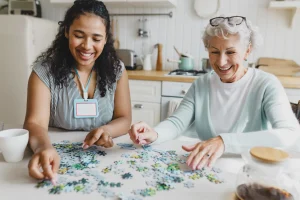When the time comes to seek home care for a loved one, the decision can feel overwhelming. With so many services available, how do you know what kind of support is right—and how do you make sure it’s truly a good fit?
At IOA Home Care, we believe that finding the right caregiver match is just as important as choosing the right type of care. It’s not just about services—it’s about relationships, trust, and building a care experience that feels personal and seamless.
Understanding Different Types of Home Care Needs
Home care isn’t one-size-fits-all. The kind of support your loved one needs will depend on their health, mobility, cognitive abilities, and social situation. Some of the most common types of home care include:
- Dementia Care: Specialized support for individuals living with Alzheimer’s or other forms of dementia, often requiring redirection, memory support, and experienced caregivers comfortable with behavioral shifts.
- Recovery Support: Short-term care for those recovering from surgery or illness—such as hip replacements, knee surgeries, or hospital stays—who may need help with mobility, bathing, meals, or medication management.
- Companion Care: For older adults who may not have complex medical needs but benefit from social connection, light assistance, and emotional engagement.
Knowing what type of care your loved one needs is the first step. But knowing who’s providing it—and how well they match your loved one’s personality, culture, and daily rhythms—is just as vital.
Why the Right Match Matters More Than the Right Service
Every home care agency may promise personalized care—but at IOA Home Care, we take that promise seriously.
A good caregiver-client match can build trust, comfort, and long-term consistency. A mismatch, on the other hand, can create frustration or resistance—sometimes even leading families to walk away from home care entirely.
That’s why we don’t “plug and play.” We listen, assess, and design a care relationship that works for the client and the caregiver. Because one great experience builds momentum, while one bad experience can undermine the entire process.
How IOA Builds Personalized Care Matches That Last
At IOA Home Care, our care managers work closely with families to understand:
- The level of care needed
- Your loved one’s communication style and personality
- Language preferences and cultural values
- Daily routines and lifestyle expectations
- Geography and transportation needs
We then match caregivers based not just on availability, but on experience, compatibility, and proximity—because we believe great care starts with the right connection.
Care managers at IOA Home Care stay with your family throughout the journey, helping adapt care plans, answer questions, and provide continuity and reassurance at every stage.
Signs It May Be Time to Adjust or Add More Care
Sometimes, families start with just a few hours a week—especially when a loved one is hesitant to accept care. That’s okay. Starting small helps build trust.
But over time, needs may shift. Some signs it may be time to expand or adjust care include:
- Missed medications or meals
- Increased confusion or isolation
- Decline in hygiene or mobility
- Safety concerns, especially in dementia progression
- Caregiver burnout within the family
Caregivers and care managers are trained to notice these changes and start a supportive, informed conversation about what comes next.
Matching the Right Caregiver Is at the Heart of What We Do
At IOA Home Care, we know that caregiving is more than a service—it’s a relationship. That’s why we match our caregivers with intention, compassion, and care. Because when the right person walks through the door, it can change everything.
If you’re beginning your home care journey or unsure where to start, we’re here to help. Learn more about IOA Home Care and schedule a consultation.





